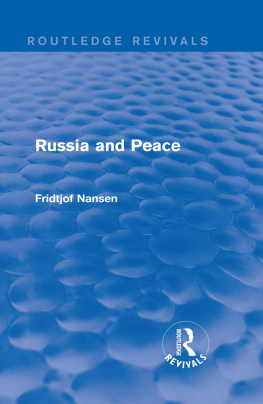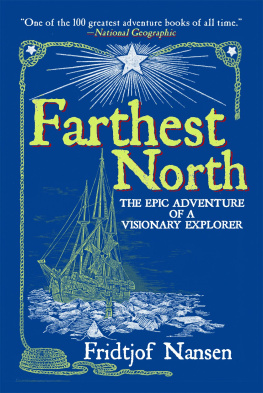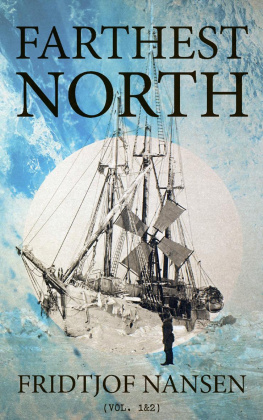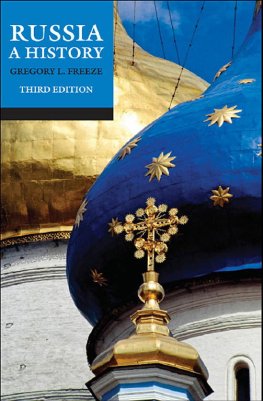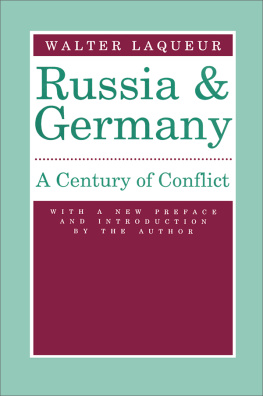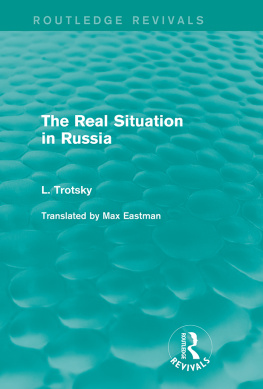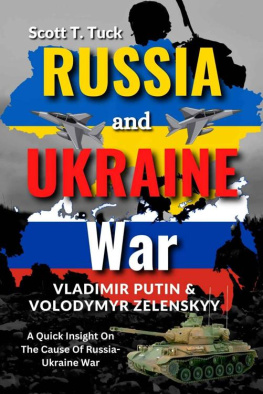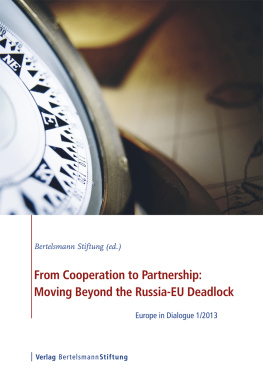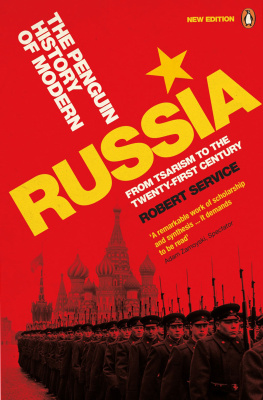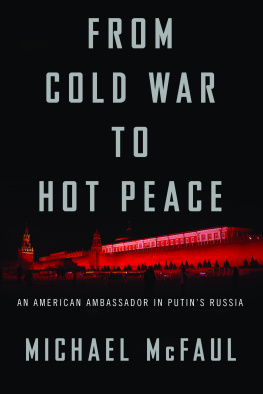First published in 1923
by George Allen & Unwin
This edition first published in 2015 by Routledge
2 Park Square, Milton Park, Abingdon, Oxon, OX14 4RN
and by Routledge
711 Third Avenue, New York, NY 10017
Routledge is an imprint of the Taylor & Francis Group, an informa business
1923 Dr. Fridtjof Nansen
All rights reserved. No part of this book may be reprinted or reproduced or utilised in any form or by any electronic, mechanical, or other means, now known or hereafter invented, including photocopying and recording, or in any information storage or retrieval system, without permission in writing from the publishers.
Publisher's Note
The publisher has gone to great lengths to ensure the quality of this reprint but points out that some imperfections in the original copies may be apparent.
Disclaimer
The publisher has made every effort to trace copyright holders and welcomes correspondence from those they have been unable to contact.
A Library of Congress record exists under LC control number: 24002642
ISBN 13: 978-1-138-91073-7 (hbk)
ISBN 13: 978-1-315-69325-5 (ebk)
THE more one sees of the unbounded incompetence and national self-righteousness everywhere so blatantly manifest to-day, the more clearly does one become convinced that the first condition for finding a wayif a way there beout of Europe's present confusion and advancing disintegration must be the attainment of a better mutual knowledge and understanding between its various peoples.
Another people's outlook, actions, and conditions generally, should be judged as far as possible by the norm of its own psychology, way of thinking, and preconceptions, and not by our own, This is surely the first and chief condition for being able to understand, and yet it is the one sinned against most often, indeed daily, and not least in the case of Russia and Russian affairs.
In this book the endeavour has been made to render, without prejudice, passion or partisanship, a brief account of the existing social, and especially economic, conditions in this vast and unhappy country, in the light of my impressions and those of my collaborators during the years that we have worked there, and of the information that we have obtained from the sources which seemed to be most reliable.
That these brief impressions make no claim to be exhaustive in any direction, goes without saying; the immense Russian problem is far too involved and complex for that to be possible. Their aim is to help in laying the foundation for a more objective comprehension of present-day Russia and her future possibilities.
During the last decade the attitude towards Russia has changed in a very remarkable way. Before the Great War she figured as the huge menacing bugbear of the East, the barbaric despotism, the aggressive power, the great Slav peril to Western Europe and its civilisation. In particular, the treacherous oppression of the Finnish people gave Scandinavians a warning of what they could expect if they came under the iron Russian heel.
France's alliance with the " barbaric despotism " of the East was regarded as treason against the traditions of France, representing as she did the fight for liberty and the rights of man. Nowhere was this view more commonly prevalent than in Germany.
Then the World War broke out, and the Germans proclaimed that Germany's armies were really championing the cause of Europe, and the Scandinavian nations in particular, against the barbarism of the East.
But the points of view have veered round. No longer do we detect in Germany any widespread feeling that Russia is the great menace to be kept at bay; if anything, the opposite view is held, and that, too, whether the Russian realm is contemplated as permanently Bolshevik, or as potentially Tsarist.
On the other hand, the nations farther to the west of Europe maintain a more hostile attitude towards Russia. In spite of the great services which the people of Russia rendered, at fearful cost to themselves, to the Western Powers during the most critical days of the war, the Governments of the West now seem disposed to let the Russian nation perish because it is subject to a Government to whose methods and terrorism they cannot reconcile themselves.
All this is essentially a matter of politics. But what is needed now is to try to get on, without paying heed to these changeable political moods, to an objective grasp of the facts as they really exist and must develop.
It is clear that Russia, conceived as a factor in the development of world civilisation, with its great intellectual and material importance in the world's domestic economy, cannot in the long run remain in bondage to shifting political systems, especially when these are largely imported from without.
A people's development strikes deeper roots; a people is a living organism, with its own inner life, and in the long run it win refuse to be held in check or directed by fortuitous rulers, even though these should succeed in putting forward or retarding the clock of evolution for a time.
All Governments are transitory. The people and the soul of the people endure.
Doubts may be entertained regarding the future of Western Europe and West European civilisation; but there can hardly be room for doubt that the Russian people has a great future before it, and a great mission to fulfil in the further life of Europe and the world.
Even as the expanse of Russian and Siberian plains holds immense potentialities in its great treasures of wholly virgin or only partially cultivated land, so does the Russian people contain great reserve forces of unused intellectual and moral power.
Russia's civilisation has not yet burst forth into blossom: it still belongs to the future.
The civilisation of Russia, as we have known it hitherto under the Romanoffs, has certainly not been Russian. It was a thin, West-European veneer, imported and renewed from without, just as its centre of culture, St. Petersburg, was merely an extremely uninspired copy of Europe, executed in stucco and plaster.
Only when one's eyes catch a first glimpse of Moscow, with the Kremlin's wonderful walls and towers, rising amid the surrounding plains, does one feel oneself on the threshold of another civilisation. This is no longer Europe, nor yet the Orient ; it is Russia.
Again, Bolshevism cannot be said to be really Russian. While its inner mechanism is more or less a copy of Tsardom turned upside down, the revolution itself was modelled, down to the smallest detail, on Europe, just as its theory, Marxism, was almost directly imported thence. But the idealismthe remarkable capacity for devotion by which it is largely sustainedis genuinely Russian.




